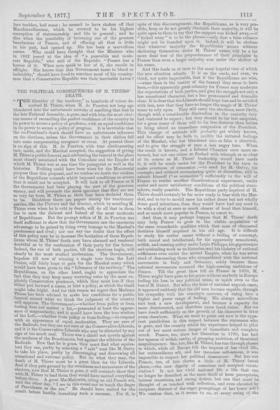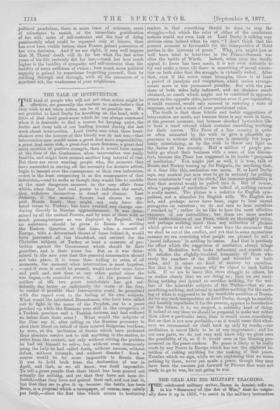HE POLITICAL CONSEQUENCES OF M. THIERS' DEATH.
" THE liberator of the territory," as hundreds of voices de- scribed M. Thiers, when M. de Fourtou not long ago blundered into the unfortunate mistake of ascribing that feat to the late National Assembly, is gone, and with him the most obvi- ous means of reconciling the perfect confidence of the country in its power to secure a policy of prudence, with an equal confidence in its power to secure a policy of progress. It is inevitable that the ex-President's death should have an unfortunate influence on the elections, unless the Government in their elation fall into some compensating arrogance or error. At present there is no sign of this. M. ,de Fourtou, with true electioneering tact, made, and the Marshal accepted, the suggestion of giving M. Thiers a public funeral, and celebrating the funeral in the place most closely associated with the Consulate and the Empire of which M. Thiess was at one time the panegyrist as well as the historian. Nothing could have been wiser for the Ministerial purpose than this proposal, and we confess we doubt the wisdom of the Republican counsels which imposed conditions so severe that it could not be accepted. It will look to all France as if the Government had been playing the part of the generous enemy, and will persuade the more ignorant that they are not so very far from M. Thiess as their foes have declared them to be. Doubtless there are papers among the reactionary parties, like the Univers and the Gaulois, which by assailing M. Thiers even when he is cold in death, will do all that in them lies to earn the distrust and hatred of the most moderate of Republicans. But the prompt action of M. de Fourtou was Itself sufficient to show that the Government saw the enormous advantage to be gained by doing every homage to the Marshal's predecessor and rival ; nor can any one doubt that the effect of this policy may be to increase the hesitation of those Repub- licans whom M. Thiers' death may have alarmed and rendered doubtful as to the moderation of their party for the future. Indeed, the cue of both parties, till the elections begin, will clearly be the most studied moderation. The Government, hopeless till now of winning a single vote from the Left Centro, will fairly hope to gain for the Marshal many which would have been given to the "Liberator of the territory." The Republicans, on the other hand, ought to appreciate the fact that they May keep many wavering votes by the most ex- plicitly Conservative prudence, which they must lose if they either put forward a name, or hint a policy, at which the timid might take fright. And for this reason we regret that Madame Thiers has been advised to make her conditions for a public funeral exceed what we think the judgment of the country will approve. The Government,—whether from policy or from feeling does not matter a bit,—presented at least the appear- ance of magnanimity, and it would have been the true wisdom of the Left,—whether from policy or from feeling,—to respond with an appearance of equal moderation. They are sure of the Radicals, but they are not sure of the Conservative-Liberals, and it is the Conservative-Liberals who may be alienated by any sign of too much zeal. Thiess was a shield not merely against the madness of the Reactionists, but against the wildness of the Radicals. Now that he is gone, they must find what equiva- lent they can, partly by selecting a "safe" man like M. Grvy 'to take his place, partly by discouraging and disavowing all .sensational and extreme policy. But do what they may, the death of M. Thiers must be a great blow for the Liberals. And if they gain ground by the steadiness and earnestness of the electors, now that M. Thiers is gone, it will certainly show that with M. Thiers to lead them they would have carried everything before them. A great MaeMahonist, citing an old French wit, said the other day, "I see in this event not so much the finger .af Providence as the toe." He should have waited for the result before hastily launching such a sarcasm. For if, in
spite of this discouragement, the Republicans, as is very pos- sible, keep or do not greatly diminish their majority, it will be quite open to them to say that the support was kicked away,—if "kicked away" is to be the phrase—only that a false reliance might not be founded upon it. Indeed, it will be obvious that whatever majority the Republicans secure without sheltering themselves under M. Thiers' name, will be a far more final test of the preponderance of their principles in France than even a larger majority won under the shelter of his name.
And this leads us at once to the most hopeful view of which the new situation admits. It ie on the cards, and even, we think, not quite improbable, that if the Republicans are wise, —wiser than in the matter of the funeral they seem to have been,—this apparently great calamity for France may moderate the expectations of both parties, and give the struggle not only a less sensational character, but a less pronounced and dramatic close. It is clear that the Liberals should hope less and be satisfied with less, now that they have no longer the magic of M. Thiess' name to rely upon. They will carry the elections, most likely, though with a considerable diminution in the majority they had ventured to expect ; but they should be far loss sanguine, for a groat many of them will be far less desirous than before to bring about an immediate resignation of the President. This change of attitude will probably get widely known, and its effect may be both to mollify the irritated feelings of the Marshal, who has blundered into so false a situation, and to give the struggle at once a less angry tone. When the result is known, and. a Liberal Chamber once more re- turned, but not one either so flushed with triumph or so clear of its course as M. Thiess leadership would have made it, it will be much easier for the President in his turn to make overtures of concession ;—to send for M. Gr6vy, for example, and without surrendering quite at discretion, still to submit himself (" se soumettre") sufficiently to the will of France to render another Constitutional experiment, under cooler and more satisfactory conditions of the political atmo- sphere, really possible. The Republican party deprived of M. Thiess should certainly be far more ready to bear with the Mar- shal, and to try to mould anew his rather dense but not wholly dense good intentions, than they would have had any need to be with a rival at once so much clearer of head than himself, and so much more popular in France, to resort to. And thus, it may perhaps happen that M. Thiele' death may help France to grow in the visible acquisition of the same remarkable qualities which that man of chequered destinies himself acquired in his old age. It is difficult to study his earlier career without a feeling of contempt, both moral and intellectual, for his apparently sensational, selfish, and cunning policy under Louis Philippe, his gigentesque and misleading work as an histmiens and his idolatry of national selfishness even under the second Empire, when he was never tired of denouncing those who sympathised with the national movements in Italy and Germany, solely because those national movements menaced the high-soaring ambitions of France. Till the great blow fell on France in 1870, M. Thiess might have gone to his grave without anybody in Europe feeling his loss, in any political sense, so much even as the loss of M. Guizot. But when the hour of national anguish came, it appeared suddenly that the old man became capable, through his sympathy with his country's sorrows, of rising into a higher and purer range of feeling. His always marvellous tact took a new development, and became a capacity for more disinterested, and therefore more lucid vision. But we have dwelt sufficiently on the growth of his character in later years elsewhere. What we want to point out now is the appa- rent parallelism in this respect between the statesman who is gone, and the country which his experience helped to pilot out of her most serious danger of immediate and complete wreck. France, too, since her liberation in 1789, has had her spasms of selfish vanity, of grasping ambition, of theatrical magniloquence. She, too, like M. Thieve, has run through phases in which, while all Europe felt the impress of her vivid life, her extraordinary wit, and her immense self-esteem, it was impossible to respect her political demeanour. But has not France, too, of late shown a little of M. Thiess' latest phase,—the new dignity of conscious and accepted renun- ciation? Is not her vivid national life a life that can no longer be described as the mere thrill of keen perceptions, intense sensations, and strong desires, but one that must be thought of as touched with reflection, and even elevated by incipient distrust of the eager promptings of her lower self ? We confess that, as it seems to us, at every swing of the political pendulum, there is more trace of reticence, more of reluctance to snatch at the immediate gratification of her will, more of self-restraint and the fear of doing passionately what could be repented only at leisure, than has ever been visible before, since France gained possession of her own destinies. And if we are right, it may well happen that M. Thiers' death will do for her what the last seven years of his life certainly did for her,—teach her how much higher is the lucidity of sympathy and self-restraint than the lucidity of mere swiftness of vision ; how much more political sagacity is gained by sometimes forgetting yourself, than by riddling through and through, with all the resources of a mordant wit, the weaknesses of your neighbours.































 Previous page
Previous page